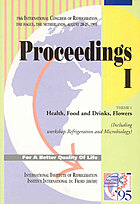
IIR document
Psychrotrophy and adaptation to low temperatures: microbial membrane lipids.
Author(s) : RUSSELL N. J.
Summary
Cold-adapted microbes must be capable of growing at low temperatures. They contains proteins which have evolved over a long timescale to function at such temperatures. In the short-term it is the ability to adapt membrane lipid fatty acid composition which is relevant to the ability of cold-adapted microbe to out-compete another in a foodstuff. A decrease in growth temperature may result in an increase in fatty acid unsaturation or methyl branching, a change in type of branching, or a decrease in acyl chain length, or a combination of any of these alterations. The mechanisms which are used vary from one microbe to another. Moreover, the response of any one particular species can vary depending on the available nutrients and other conditions of growth. However, a common feature of all these changes is that they are a mechanism to prevent the lipid bilayer within the membrane converting from the liquid-crystalline to the gel phase. Such preservation of the fluidity of the cellular membrane(s), is vital for a cold-adapted microbe to grow and divide, and therefore to compete effectively with other microbial flora within the food.
Available documents
Format PDF
Pages: 359-365
This document is to be digitised and will be available within 10 working days
Public price
20 €
Member price*
Free
* Best rate depending on membership category (see the detailed benefits of individual and corporate memberships).
Details
- Original title: Psychrotrophy and adaptation to low temperatures: microbial membrane lipids.
- Record ID : 1996-0931
- Languages: English
- Source: For a Better Quality of Life. 19th International Congress of Refrigeration.
- Publication date: 1995/08/20
- Document available for consultation in the library of the IIR headquarters only.
Links
See other articles from the proceedings (488)
See the conference proceedings
Indexing
- Themes: Refrigeration and perishable products: general information
- Keywords: Food; Cell; Microorganism; Microbiology; Lipid; Chilling; Adaptation; Psychrotroph; Membrane
-
Stress responses of microorganisms to low tempe...
- Author(s) : ABEE T., ROMBOUTS F. M.
- Date : 1995/08/20
- Languages : English
- Source: For a Better Quality of Life. 19th International Congress of Refrigeration.
- Formats : PDF
View record
-
Adaptation au froid des micro-organismes : impo...
- Author(s) : LABADIE J. C.
- Date : 1998/09/16
- Languages : French
- Source: Hygiene, Quality and Safety in the Cold Chain and Air Conditioning.
- Formats : PDF
View record
-
Guarantee of competitive capacity and effective...
- Author(s) : ANDREEV S. P.
- Date : 2004/12/06
- Languages : Russian
- Source: Refrigeration industry in the 21st century + CD-ROM.
View record
-
Predictive models used to measure the interacti...
- Author(s) : PIN C., BARANYI J.
- Date : 1997/06/16
- Languages : English
- Source: Predictive Microbiology Applied to Chilled Foods Preservation
- Formats : PDF
View record
-
CRYOTECHNIQUES IN THE EXAMINATION OF FOOD.
- Author(s) : HEATHCOCK J. F.
- Date : 1988
- Languages : English
View record
